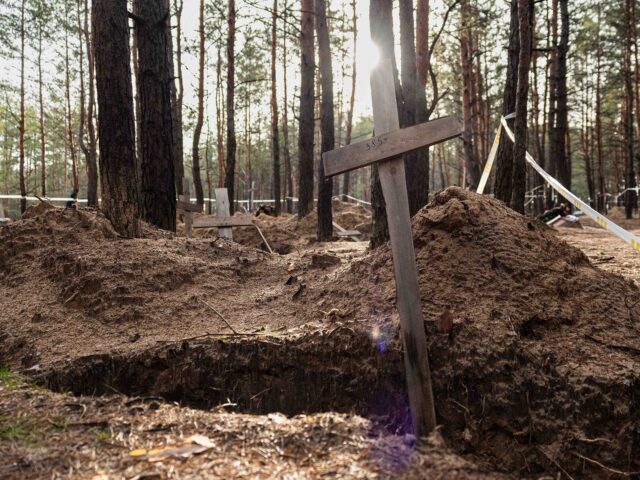The United States government has now officially accused Russia of war crimes.
President Joe Biden declared in his address in Warsaw, Poland, last week that Russia had committed “crimes against humanity.” Although his announcement has no legal import, it may well encourage the International Criminal Court (ICC) to move more aggressively.
There can be no doubt that as a matter of international law, Russia is committing war crimes against the Ukrainian people.
Deliberately targeting civilians is a war crime. So is killing a number of civilians, even if not specifically targeted, that is disproportionate to the legitimate military value of the target.
The evidence is clear that Russia is committing both of these categories of criminal behavior. These crimes do not, in my view, qualify as “genocide” — the worst crime of all — but they do meet the standards for crimes against humanity. The crimes of which they have been accused justify investigation and likely prosecution by appropriate international tribunals, as well as by nations whose courts claim universal jurisdiction over such crimes.
The remaining question is whether such tribunals exist and, if so, whether they are willing and able to bring perpetrators to justice. Neither Russia nor Ukraine (nor the U.S.) is a signatory to the Rome Treaty that established the ICC, though Ukraine has submitted to its jurisdiction. But the ICC claims the power to investigate and prosecute all war criminals, without regard to the country they belong to, if they can secure personal jurisdiction over them.
The court has no jurisdiction over nations, only individuals. There are ongoing efforts therefore to identify specific Russian individuals who are responsible for war crimes. If they are identified, arrest warrants can be issued, and if they are arrested, they can be brought to The Hague and placed on trial. Obviously, the perpetrators include high-ranking Russian officials, including President Vladimir Putin, as well as several generals. It is highly unlikely, however, that these criminals will leave the safety of Russia, Belarus, or other nations that will not allow their arrest. Moreover, diplomatic immunity poses barriers to arrest.
Nonetheless, it would be important for the prosecutors in The Hague to conduct criminal investigations and issue warrants for anyone against whom the evidence the evidence supports arrests. Even if only symbolic, criminal warrants might well have some deterrent impact on culpable lower-ranking Russian soldiers and civilians who may someday want to travel beyond the safety of their home country.
Accordingly, the ICC prosecutor‘s office should establish (if it has not already done so) a task force designed to gather and evaluate all available evidence of war crimes.
The focus should be on Russian actions, but if there is evidence of any Ukrainian war crimes by specific soldiers or others, they, too, must be investigated and, if warranted, prosecuted. War crimes know no uniforms or nations. They are individual, as well as collective.
Unfortunately, war crimes are committed in virtually all protracted military conflicts. And the term “war crimes” has been weaponized by all sides and thrown around so promiscuously as to lose much of its meaning and moral force. It is being selectively applied (and ignored) by the United Nations institutions, by non-governmental organizations (NGOs) such as Amnesty International, and by some media.
But what Russian forces have done and allegedly continue to do — targeting apartment buildings, murdering civilians with hands tied behind their backs, raping women — is so clearly criminal that these actions must be prosecuted if the prohibition against war crimes is to retain any credibility.
Much of the evidence of war crimes is already publicly available from video footage and eyewitness accounts. Russians have offered no defense beyond the usual “they are doing it, too,” and the false claim that the accidental victimization of occasional civilians is “collateral damage”.
These excuses will suffice neither in an actual court or the court of public opinion.
There is the risk, of course, that if Putin is indicted — even if he cannot be arrested — he will escalate his criminal behavior, because he has nothing further to fear from the courts. But this danger should not deter the ICC from doing its job: identifying, investigating, indicting, and, where possible, prosecuting war criminals, regardless of their status or position.
So let the investigations commence. Let the warrants issue. And let the process of justice commence, even if it will never be satisfactory completed.
Alan M. Dershowitz is the Felix Frankfurter Professor of Law Emeritus at Harvard Law School and and the author most recently of “The Case for Color Blind Equality in the Age of Identity Politics,” and “The Case for Vaccine Mandates,” Hot Books (2021). Read more of Alan Dershowitz”s reports — Here.
Follow Alan Dershowitz on
Twitter: @AlanDersh
Facebook: @AlanMDershowitz
New podcast: The Dershow, on Spotify, YouTube and iTunes

COMMENTS
Please let us know if you're having issues with commenting.